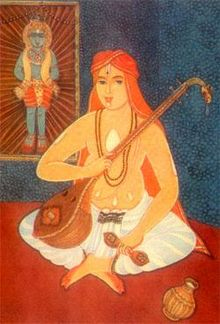Sri Purandara Dasa was a great devotee of Lord Krishna, a poet and a musician. He is considered as the father of Carnatic Music.
His Early Days and Childhood

Initially, Srinivasa Nayaka was not drawn towards the spiritual path. He continued with the family business and increased it multifold. He was known as ‘Navakoti Narayana’ a man of abundant wealth, but he was a miser who would not give a coin to anyone.
Purandara Dasa’s Transformation
According to tradition, there is a beautiful story which relates how Srinivasa Nayaka, the ‘Navaloti Narayana’ became Purandara Dasa.
The Tale
A poor Brahmin frequently visits Srinivasa Nayaka’s shop and asks him for help. To put him off, Srinivasa Nayaka one day gives him a few worthless coins and tells him not to come back. The Brahmin then meets Srinivasa Nayaka’s wife, who’s a kind-hearted lady. Moved by the Brahmin’s story, she gives him her nose-stud which was a gift from her mother.
The Brahmin goes to Srinivasa Nayaka and tries to sell this jewel to him. Identifying his wife’s jewel, Srinivasa Nayaka locks it away and rushes back to his house. He confronts his wife, tells him how he got the jewel and angrily demands that she show him her nose stud to him if she has it. Unable to answer him, she prays to Lord Krishna, and miraculously, the jewel appears in her palm.
This incident changes Srinivasa Nayaka’s life and he realizes that it was the Lord Himself who had come to correct him. He then gives up all his wealth and starts a new life with his family
After his renunciation, Srinivasa Nayaka became the disciple of the great saint Vyasaraja, who gave him the title Purandara Vittala, after the Lord of Pandarpur. From that day on, Srinivasa Nayaka came to be known as Purandara Dasa.
Purandara Dasa as a Devotee
Purandara Dasa lived the life of a mendicant who had to beg for his food. He would start each morning, wearing tinkling anklets on his feet, a Tulasi Mala on his neck and carrying a Tamboora in his hands. He would go round the streets singing beautiful songs that he composed himself, in praise of Lord Hari.
The songs, composed in simple, easy to understand Kannada and set to enchanting music, enthralled everyone who heard it. Whatever he received at the end of the day, he would take home to his family. This was his life after he had given away all his wealth and turned his mind towards Bhakthi.
Purandara Dasa’s Compositions
Purandara Dasa is said to have composed around 475,000 songs, in Kannada and Sanskrit. Only about a 1000 are available now. Purandara Dasa’s songs express his love for Lord Narayana, especially Sri Krishna. He sings of various aspects of Sri Krishna’s life. In many of these songs, he also satirizes all the various pretensions and vices prevailing in the society.
He makes fun of the false Bhakthas who profess all outward signs of Bhakthi without a kind thought or true devotion in their hearts. His compositions are enchantingly beautiful and these have inspired many musician-poets in Karnataka.
The Father of Carnatic Music
Purandara Dasa is considered to be the father of Carnatic Music, as he formalized the music system which was a blend of various traditions of South India and the musical science as explained in the Vedas. He devised a system of teaching Carnatic music in graded lessons.
Purandara Dasa identified 84 ragas. Each of his lyric is a beautiful musical composition. His works touched a variety of musical types – Kritis, Keertans, Padams and even many rare forms of music. His influence on Carnatic Music is profound. Sri Thyagaraja was greatly influenced by him and offered homage to him in his Prahalada Bhakthi Vijayam.
Purandara Dasa is said to have lived till he was 80. He used the all-powerful magic of music and the vehicle of vernacular language to touch the hearts of people with devotion.